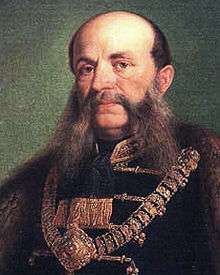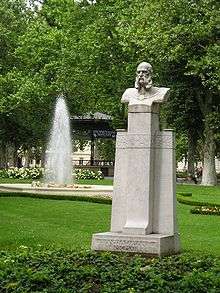Ivan Mažuranić
Ivan Mažuranić (pronounced [ǐv̞an maʒǔranitɕ]; 11 August 1814 – 4 August 1890) was a Croatian poet, linguist, lawyer and politician who is considered to be one of the most important figures in Croatia's political and cultural life in the mid-19th century. Mažuranić served as Ban of Kingdom of Croatia-Slavonia between 1873 and 1880, and since he was the first ban not to hail from old nobility, he was known as Ban pučanin (Ban commoner).
Ivan Mažuranić | |
|---|---|
 Portrait of Ivan Mažuranić | |
| Ban of Croatia-Slavonia | |
| In office 20 September 1873 – 21 February 1880 | |
| Monarch | Franz Joseph I |
| Preceded by | Antun Vakanović |
| Succeeded by | Ladislav Pejačević |
| Personal details | |
| Born | 11 August 1814 Novi Vinodolski, Kingdom of Croatia, Austrian Empire |
| Died | 4 August 1890 (aged 75) Zagreb, Austria-Hungary |
| Nationality | Croatian |
| Political party | People's Party Independent People's Party |
| Relatives | Ivana Brlić-Mažuranić (granddaughter) |
| Alma mater | University of Zagreb University of West Hungary |
| Occupation | Poet, lawyer, politician |
| Known for | The Death of Smail-aga Čengić (poem) |
| Signature |  |
His realistic assessment of strengths and weaknesses of Croatia's position between the hammer of Austrian bureaucracy and the anvil of Hungarian expansionist nationalism served his country invaluable in times of political turmoil. Mažuranić is best remembered for his contributions in the development of the Croatian law system, economics, linguistics, and poetry.
Biography
Early life and education
Ivan Mažuranić was born on August 11, 1814 as the third of four sons into a well-to-do yeoman family of Ivan Mažuranić Petrov in Novi Vinodolski in northern coastal Croatia. His brother Josip was in charge of taking care of the family estate, Anton was a famous jurist and philologist, while Matija, blacksmith by profession, was a travel writer who wrote "A Look at Bosnia" (1842) in which he described the private and public life of Ottoman Bosnia and Herzegovina.[1] Mažuranić became a man of many abilities; he spoke 9 languages (Croatian, Latin, Italian, German, Hungarian, French, English, Czech, and Polish) and was well versed in astronomy and mathematics. He attended elementary school in Novi Vinodolski and high school in Rijeka, after which he studied law at the University of Zagreb (1835-1837) and philosophy at the University of West Hungary. After graduation he worked as a gymnasium teacher in Zagreb, and afterwards as a lawyer in Karlovac.
Politics and economy
Mažuranić was the first Croatian ban not to hail from old nobility, as he was born a commoner.[2] He held the office from September 20, 1873 until February 21, 1880. He was a member of the People's Party.
He accomplished the Croatian transition from a semifeudal legal and economic system to a modern civil society similar to those emerging in other countries in central Europe.
Mažuranić has modernized Croatia's educational system by forming a public school network and reducing the importance of denominational schools;[2] a process seen by some later Serbian ideologues as an intentional blow to the integrity of Serbdom in Croatian lands.[3] Others consider this to have been a necessary step in modernization and secularization of Croatian society.
Law reforms
Almost immediately after his election as Ban, Mažuranić started with the implementation of comprehensive reforms. During the period of his reign, Sabor passed 60 laws covering the whole area of Croatian autonomous jurisdiction. Ideological foundation of his reforms was liberal. He emphasized the importance of the Constitution, individual rights, education, science and laissez faire. The main goal of his reforms was to form foundations of the organization of autonomous Croatian government and establishment of a modern and efficient political-administrative system.
Linguistics

His linguistic work is remarkable for its enormous influence. Mažuranić's "German-Illyrian/Croatian Dictionary", 1842 (coauthored with Josip Užarević) is at the very heart of modern Croatian civilization, since in this 40,000-entry dictionary the principal author Mažuranić had coined words that have become commonplace in standard Croatian—for instance, Croatian words for bank accountancy, rhinoceros, sculptor, ice-cream, market economy, high treason or metropolis. He was much more than "language-recorder"; "language-shaper" would be a better description.
Poetry
But, in his native land, Mažuranić is above all the beloved poet of Smrt Smail age Čengića—"The Death of Smail-aga Čengić", 1845. This epic poem is full of memorable verses that have become embedded in the national memory of his people, who cherished it as the treasure of a "Homeric" wisdom praising such epic virtues as fortitude, fidelity, and justice.
The tale is based on an assault in Montenegro, when a petty local Muslim tyrant was killed, as an act of vendetta, in an ambush set by Montenegrins. Mažuranić's poetry transformed a rather prosaic act of tribal revenge into a hymn celebrating the struggle for freedom—acted out under the hostile forces of fatality.
Ljutit aga mrko gleda |
The angry aga glumly glances |
Following in the steps of Croatian poets like Kačić and Ivan Gundulić (his chief national influence, whose main epic Osman Mažuranić completed), Mažuranić closed the era of Romanticism and of classic epic poetry in Croatian literature.
Personal life
Ivan Mažuranić was married to Aleksandra Mažuranić (née Demeter), sister of the renowned Croatian poet Dimitrija Demeter.
Legacy
- Mažuranić's portrait is depicted on the obverse of the Croatian 100 kuna banknote, issued in 1993 and 2002.[4]
- Ivan Mažuranić Square in Zagreb is named in his honor.
- During the Croatian accession to the European Union, Nova TV has launched a campaign 'I believe in Croatia' referring to the introduction of Mažuranić's famous speech that he gave on 13 December 1886 before the Sabor; "I believe in Croatia, in its past, in its present and its future."
See also
References
- http://www.matica.hr/kolo/435/%C5%BDivot%20i%20djelo%20Ivana%20Ma%C5%BEurani%C4%87a/
- "Mažuranić, Ivan". Proleksis Encyclopedia. Retrieved 2011-01-20.
- "Ivan Mažuranić: liberalne reforme Hrvatskog sabora 1873.-1880. i srpska elita u Hrvatskoj" (PDF) (in Croatian). Archived from the original (PDF) on 2014-07-14. Retrieved 15 May 2012.
- Croatian National Bank. Features of Kuna Banknotes Archived 2009-05-06 at the Wayback Machine: 100 kuna Archived 2011-06-04 at the Wayback Machine (1993 issue) & 100 kuna Archived 2011-06-04 at the Wayback Machine (2002 issue). – Retrieved on 30 March 2009.
External links
| Wikimedia Commons has media related to Ivan Mažuranić. |
| Political offices | ||
|---|---|---|
| Preceded by Antun Vakanović |
Ban of the Kingdom of Croatia-Slavonia 1873–1880 |
Succeeded by Ladislav Pejačević |
| Cultural offices | ||
| Preceded by Ambroz Vranyczany |
President of Matica hrvatska 1858–1872 |
Succeeded by Matija Mesić |